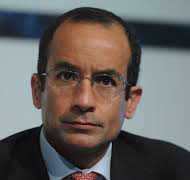If you think that the corruption scandal swirling around Brazilian President Michel Temer is the only one that will shake Latin America in coming weeks, mark your calendar: There will be many more corruption-related headlines across the region starting on June 3.
That’s the day the attorney general’s office in Brazil will start disclosing the bulk of the names of government officials in 11 countries who took nearly $800 million in bribes from the Odebrecht construction giant in one of the region’s biggest corruption scandals ever. Unlike Temer’s latest corruption scandal, which surfaced after press reports of a tape in which he allegedly endorsed a bribe to a leading legislator, the Odebrecht revelations will touch political figures across Latin America.

Ironically, it may be one of the best things to happen in the region recently. It could spark an extraordinary public uproar, and become a turning point in the region’s age-old battle against corruption.
an extraordinary public uproar, and become a turning point in the region’s age-old battle against corruption.
In the short term, these corruption scandals can rock countries’ economies. Brazil’s stock market plunged more than 10 percent on May 18, following the news about the Temer tape recording. And Moody’s credit rating agency said that the Odebrecht scandal will slow down several countries’ growth this year, because large-scale Odebrecht infrastructure projects have been halted, and many investors will become scared by upcoming revelations.
“It may be the equivalent of a magnitude 9 earthquake,” says Jose Ugaz, head of the Transparency International anti-corruption advocacy group, referring to scheduled disclosures by Brazilian authorities. “There will be a flood of data concerning all affected countries.”
The names of the bribe recipients will come from the testimony of imprisoned former Odebrecht head Marcelo Odebrecht. As part of his plea bargain for a reduced sentence, he testified that between 2005 and 2014 his company had paid $349 million in bribes in Brazil, $98 million in Venezuela, $92 million in the Dominican Republic, $35 million in Argentina, $34 million in Ecuador, $29 million in Peru, $11 million in Colombia and $10.5 million in Mexico.
Once Brazilian authorities release the names of the Odebrecht bribe recipients, some countries are likely to announce creation of government anti-corruption agencies or national blueprints to eradicate graft. But none of that will do much good.
The most effective way to fight corruption in the region will be with powerful independent corruption watchdogs. The fight against corruption is too important to be left in government hands.
“You need an external agent to clean up the system, because the system will not do it by itself,” said Claudio X. Gonzalez, a Mexican businessman who heads the Mexicans against Corruption and Impunity advocacy group.
Non-governmental groups should hold their countries’ elected officials accountable for impunity, and demand full transparency in government contracts and political campaign donations, Gonzalez said.
The first thing to do should be to tackle impunity, because impunity is the mother of corruption, he said. In countries such as Mexico, 97 percent of crimes go unpunished, according to a survey by the country’s official INEGI statistics office.
Asked what concrete actions non-governmental, anti-corruption advocacy groups should take, Gonzalez mentioned the following:
First, these groups should do their own investigative reporting of corruption cases, because many Latin American media companies rely on government advertising, and don’t dig into government corruption, Gonzalez said.
Second, they should file suits against corruption suspects. Mexicans against Corruption and Impunity has already started more than a dozen lawsuits, he said.
“If civil society doesn’t get involved, we will never get rid of corruption in our countries.”
My opinion: There are some things governments can do to fight corruption, such as establishing truly independent offices of attorneys general, or negotiating national agreements with opposition parties to adopt long-term, anti-corruption policies.
But at the end of the day, Gonzalez is right. The best way to keep governments and private companies honest will be with strong non-governmental watchdog groups. The big headlines we are likely to see in coming weeks, as the list of Odebrecht bribe-takers starts coming out, should prompt the creation of powerful civil society anti-corruption monitors.









